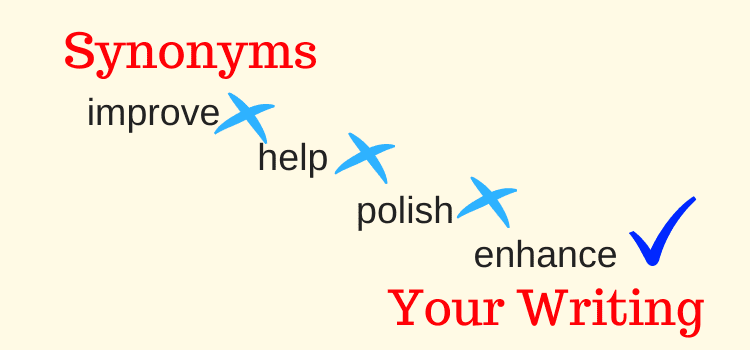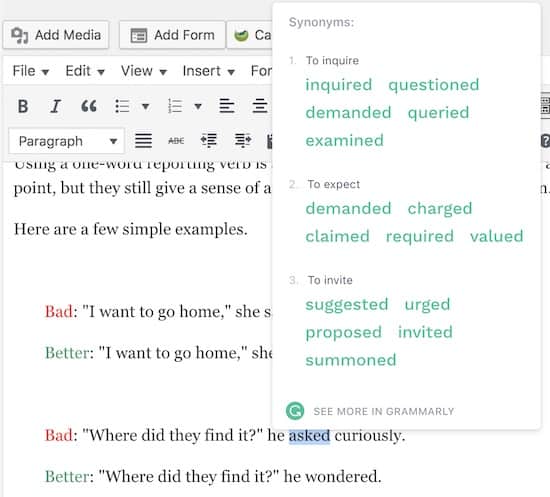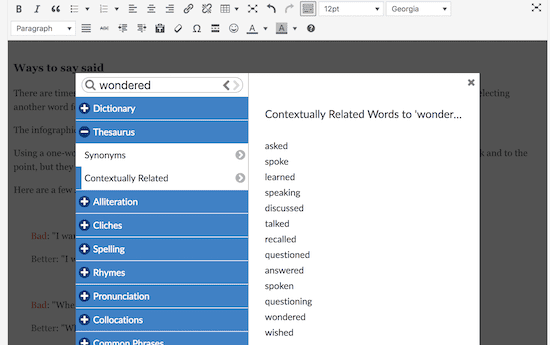
English has such a rich and varied vocabulary that we can always use synonyms in writing.
Whatever word you can think of, there is at least another equally good word you can use.
Is there another word for thesaurus? Yes, there is. It’s a lexicon, a synonymy, or a synonym dictionary.
For writers, synonyms let you express yourself better and add variety to your writing.
How to use synonyms
Most of the time, you are trying to find better synonyms to reduce repetition or express yourself slightly differently.
However, you want to avoid changing the language register or voice in your writing. Simply choosing a different word because you can is not always the best solution.
Looking at the following examples, you can see that some synonyms can change the formality or degree of intensity.
Angry: upset, furious, seething
Begin: start, commence, institute
Dangerous: unsafe, risky, treacherous
End: stop, halt, terminate
Quiet: faint, tranquil, inaudible
Fast: rapid, quick, expeditious
Write: draft, pen, inscribe
How to choose
Depending on the context, some words in the list above might not work well.
For example, each third synonym in the list would probably change the sense and intensity too much to be suitable.
Although words might mean the same thing, there are always slight differences. When you write, synonyms can change the tone of a phrase.
Always check to see if your choice is appropriate.
Another issue to be aware of is that a synonym you select might change the grammar of a sentence.
Anytime you replace a word, you should always check your sentence structure after substituting one word for another.
Yes, you will always need to choose synonyms for variety but never forget to check their fit and suitability.
Change tone
When we write, synonyms change the tone of what we are trying to say. By replacing one word, you can change the perspective. Look at these two sentences as an example.
I ran to catch the train.
I sprinted to catch the train.
The second one sounds more urgent and athletic, even though both sentences could mean the same thing.
Clive wrote a new chapter last night.
Clive drafted a new chapter last night.
In these two sentences, we are changing the sense of completion.
Mary loved the movie.
Mary adored the movie.
Here we have changed the level and tone of preference.
Always select a word with the right tone and sentiment to fit the sentence and meaning.
Language richness
You can use the verb to get in almost every sentence. But how boring does your writing become?
It doesn’t matter what you are writing.
When you see the same verb more than once or twice on a page, it’s time to get – no, become, or start being more inventive.
The richness of your vocabulary comes from the wide variety you can use in the appropriate manner and form.
You can connect better with your readers and get your message across – no, communicate your message better.
The richer your communication or storytelling is, the more powerful your writing will become – no, turn out to be.
Poetry
Not everyone is a fan of writing poetry.
But synonyms are crucial for a poet because you need to create a meter and rhythm with your words.
You are also looking for rhymes.
Of all the needs in writing for synonyms, poetry is probably top of the list.
A poet needs lots of vocabulary options to write acceptable poetry.
English variations
English is spoken all over the world, including in many countries, as a second language.
It means that so many new words become part of our language.
However, there are still differences that fail to cross the divides.
It is especially true in the variations between US and UK English.
Whether you choose sidewalk, pavement, footpath, or footway depends on where you live.
When you choose a synonym, be careful that it’s only relevant to your local English language.
If you write in US English, you will use a cell phone. Replacing it with a mobile phone, which is common in UK English, would confuse your readers.
It’s the same with words like an elevator and a lift.
The Internet is helping English to evolve and expand. But your use of regional vocabulary is still a big issue when you use synonyms in writing.
When you hunt for synonyms, especially nouns, ensure they fit with your variety of English.
History
Many English verbs evolved from other languages.
Think here about receive and get. The first is from French (recevoir), and the second is Anglo-Saxon English.
There are a vast number of verbs that derive from French.
In fact, if you use a verb of more than six letters, it could well be from French.
Your choice of verbs is important in relation to your formality of writing.
French-based verbs always tend to be more formal than English verbs.
Here’s an example.
I think he saw that there was a problem.
I think he perceived that there was a problem.
Take care when you replace verbs to make sure you retain the right level of formality in your writing.
How do you search for synonyms?
Grammar checkers
Using one of the many online grammar-checking tools might provide you with an option to look for synonyms.
It’s a great place to start because you usually get one-click access to a long list of synonyms.
If you are a Grammarly user, finding synonyms is as easy as pie. Just click on a word in your text to find a long list of suggested ideas.

For Prowritingaid users, you have a similar tool to find a long list of synonyms as you write.
As a bonus, it lists them in contextually related themes.

Online search
There isn’t much that Google can’t find. So you can simply do an online search for the word you want to replace with a synonym.
Type in the word you want to replace and add the word synonym to your search phrase.
You will get a whole list of options right there on the first page.
Dictionary or thesaurus
Do you still have a hard copy of a thesaurus or dictionary?
Well, that’s great!
But sometimes the Internet is a lot faster.
To be honest, I still trust my Oxford and Cambridge volumes a little more.
But if you are frantically trying to finish an article for a deadline, I know which is the best choice.
However, if you are writing a book, you can take your time and dust off the pages.
Either way, take the time to do your research and find the right words.
Conclusion
Synonyms evolve every year. Updates to dictionaries tell us how fast our language is changing and rapidly inventing new words.
You’ve probably taken a selfie. But did you know that selfie is an original Australian word? But now, it is used in all forms of English.
Fake news and alternative facts are very new and evolved from US politics.
Who knows how many new words will be in regular use in a few years?
It proves that our language is alive, well, and developing all the time.
As a writer, you should always be looking for different ways to express yourself.
Synonyms are just one way you can do that.
Related Reading: 350 Other Words For Said For Your Dialogue Writing




An enjoyable read on what can be a dry subject and with some useful insights. Thanks Lisa.